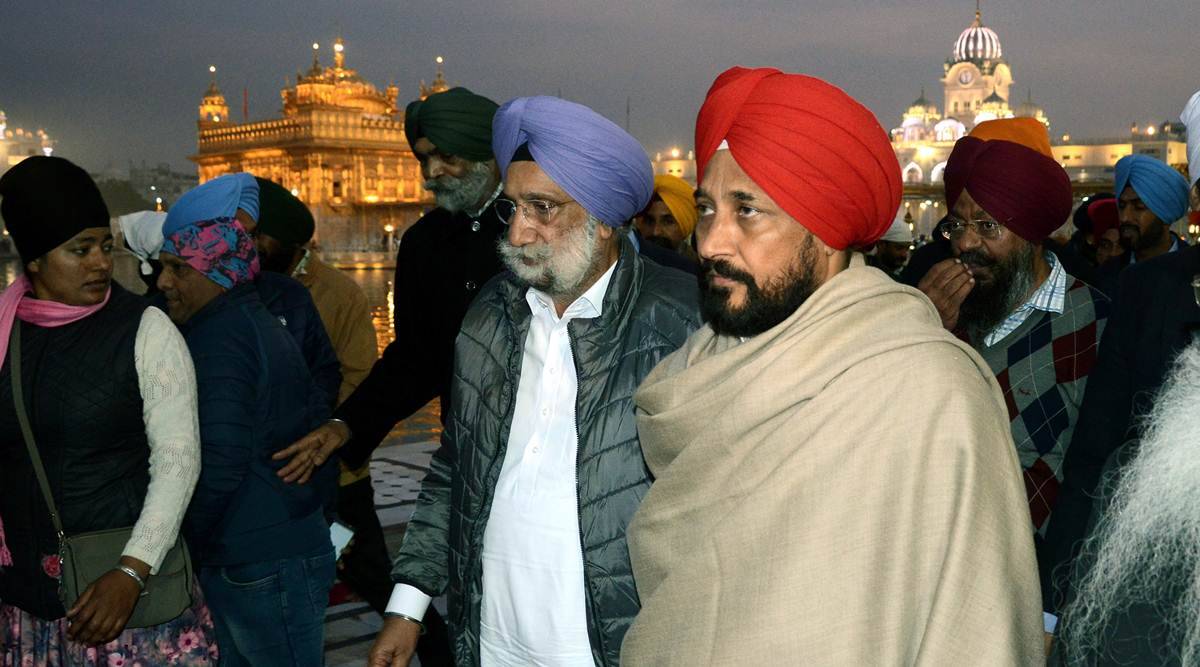 CM Channi with Deputy CM Randhawa at Golden Temple in Amritsar on Sunday. (Photo: Rana Simranjit Singh)
CM Channi with Deputy CM Randhawa at Golden Temple in Amritsar on Sunday. (Photo: Rana Simranjit Singh) The sensitive border state of Punjab was rocked by disruptive violence following the attempted sacrilege within the sanctum sanctorum of Sri Harmandir Sahib. The outrage led to lynching of the offender by the enraged. Another lynching of a person wrongly accused of sacrilege followed thereafter in Kapurthala, raising several questions concerning the quality of our democratic arrangement and political structures.
That the reprehensible desecration of holy books deserves to be unreservedly condemned in the strongest terms is unquestionable, but unlawful retribution even for an unpardonable sin is an affront both to the cherished idea of constitutional justice and the Sikh ethic of daia (mercy/compassion), inspired by the teachings of revered gurus. While the state government has done well by apprehending those responsible for the murder in Kapurthala, thereby asserting the inviolability of the principles of due process, those guilty of lynching in Amritsar are yet to be arraigned. Need we remind ourselves that democratic accountability is about taming passions of the populace to the discipline of the Constitution without which democracy regresses into anarchy. Hopefully, the insouciance of political parties and their leaders, captive to the lure of fleeting electoral victories, will not be seen as legitimation of individual retribution. Barack Obama had reminded us that “most of the sins of politics are derivative of the larger sin — the need to win, but also the need not to lose”.
Events in Punjab and elsewhere raise larger issues about the functioning of our constitutional democracy. That a crowd consumed by religious or political passions can be the prosecutor, judge, jury, and hangman at the same time offends the first principles of government by and under the law. Mob violence and vigilante justice pose grave danger to democracy, political stability and national security. Frenzied mobs endanger lives, undercut security, infract human dignity and challenge the state’s lawful authority in the ordering of society. Can the state look away when confronted with situations that challenge its very existence? Surely, the alternative to inaction or tardy action by the state cannot be a surrender to uncontrolled passions that thrive on vengeance.
Leadership is tested in trying circumstances. Abnegation of duty to protest injustice and a reluctance to take principled decisions in testing situations annuls leadership and robs the democratic state of a willing allegiance of free people. Leaders must assert moral authority, calm passions, restore sanity and ensure social harmony. Leadership is about doing what is right. It is about shaping the popular mood and not being led by it because the one merely following the crowd cannot travel beyond it. It is an inescapable lesson of history that leaders willing to sacrifice principle for power forfeit their claim to democratic leadership. Diminished leaders, we know, erode democracy while the taller ones define it. Winning elections is important but who wins if justice fails, is the question we must repeatedly ask ourselves. Indeed, democratic politics must defer to demands of justice as an index of responsive democracy and the government’s badge of moral authority over its constituents.
The quality of democracy is also reflected in how the ruling dispensations treat their political opponents. In recent years, the nation has witnessed the silencing of political adversaries through coercive processes of the criminal justice system, thereby obliterating the substantive distinction between lawful prosecution and political persecution. The Opposition in Punjab alleges likewise, albeit without evidence thus far. A reminder from history and experience in Punjab tells us that political high-handedness, howsoever camouflaged, invariably rebounds. We must learn from history to disprove the despondent conclusion of Alexis De Tocqueville that man is wandering in obscurity “as the past has ceased to throw light upon the future”. Abuse of power is a ground for questioning the right to it. And we know that waters close with astonishing speed over the political careers of those drunk on power. Narrow political impulses and transient passions cannot trench upon the sacrosanct constitutional principles that provide an enduring edifice of the nation, the foremost being the citizens’ right to justice according to procedures established by law.
Recent events in Punjab and elsewhere seen in their historical context impel us to revisit our politics and priorities so that social accord and communal harmony are not sacrificed at the altar of individual ambitions and vanities. Lest we forget, the arrogance of power does not sit well with the idea of justice. Also, little minds and leadership go ill together. Marrying power to justice remains a perennial challenge of aspiring and evolving democracies. To recall the celebrated American judge, Justice Benjamin Cardozo, “the process of justice is never finished but reproduces itself generation after generation”.
A progressive vision of our collective future anchored in the harmonious coexistence of all our people and untarnished by narrow partisan politics should define the distinction of our democracy. In an era of democratic decline, we must strive for robust “institutional predicates of democracy” — the integrity of constitutional institutions, that allow democratic engagement without fear, as a practised reality. And it must be our burden to ensure that law is not wielded as a “partisan tool” in a distortion of its role as guarantor of social and political stability.
The writer is a former Union law minister. Views expressed are personal
- The Indian Express website has been rated GREEN for its credibility and trustworthiness by Newsguard, a global service that rates news sources for their journalistic standards.

